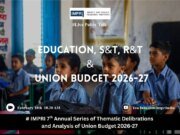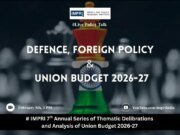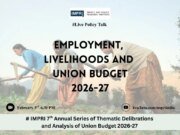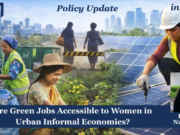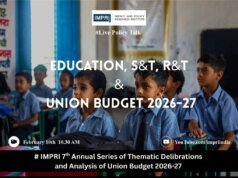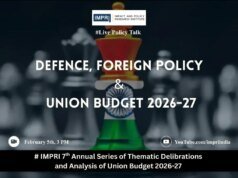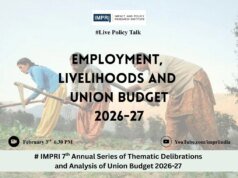Press Release
Aashnaa
As part of the IMPRI 5th Annual Series of Thematic Deliberations and Analysis of Union Budget 2024-25, the IMPRI Center for Environment, Climate Change, and Sustainable Development (CECCSD), IMPRI Impact and Policy Research Institute, New Delhi, hosted a session on “The Environment and Union Budget 2024-25.” This session provided a thought-provoking discussion at the intersection of two critical pillars shaping our nation’s future.
Mr. Ashish Kothari, Founder-Member of Indian Environmental Group Kalpavriksh, in his opening remarks, examined the budget, noting some positive aspects regarding environmental initiatives. For instance, the budget proposed helping 1 crore farmers switch to sustainable farming practices. However, there was no mention of the on-ground implementation of this initiative. Additionally, the budget promised subsidies for 1 crore houses to install solar panels, yet details on ground-level execution were lacking. There was also a significant increase in the allocation for mega solar projects, which might be socially and ecologically damaging, particularly in regions like Kutch. The expansion of solar energy needs a thorough analysis from multiple perspectives.
The Blue Revolution initiative raised alarms as it paralleled the Green Revolution, which, while increasing productivity, compromised short and long-term sustainability. The focus on marine exports could lead to overexploitation of marine resources, further straining the already struggling Indian Ocean and impacting marine biodiversity. This analysis highlights the critical need for a more comprehensive and integrated approach to budgeting that equally prioritizes environmental sustainability alongside economic development.
Mr. Debadityo Sinha, Lead of Climate and Ecosystems at the Vidhi Centre for Legal Policy, New Delhi, observed that the budget’s primary focus is on infrastructure and tourism, as reflected in the revised estimates. Wildlife was mentioned only in the context of tourism, with no clear vision for the conservation of species or environmental biodiversity. Despite an increase in financial allocations for some institutes, the budget provided less for the Indian Council of Forestry Research and Education (ICFRE). The allocation for the conservation of natural resources and ecosystems, which was a mere 7 crores last year with only 3.5 crores spent, underscores the lack of emphasis on real conservation issues.
Looking ahead, Mr. Sinha emphasized the need for more focus on species conservation, noting that the current budget allocation does not adequately address this. He also pointed out the continued emphasis on infrastructure development, which often takes precedence over environmental conservation efforts.
Professor Krishna Raj, at the Centre for Economic Studies and Policy, Institute for Social and Economic Change (ISEC), Bangalore, India, highlighted the significant gap between climate policy and climate finance. He noted that the budget essentially laid out a developmental agenda for the next 20 years, with a strong emphasis on achieving developmental goals. Climate change, being a global issue, requires international cooperation. However, major emitters like the USA and China must take more decisive action due to their increasing per capita emissions.
India aims to achieve the dual goals of development and zero emissions. Prof. Raj suggested that the ecological footprints of the rich should be addressed through measures such as a green wealth tax, which could reduce the consumption of ecological goods, address income inequality, tackle climate change, and generate revenue. Despite India’s numerous plans to reduce carbon emissions, budgetary allocations remain insufficient. Programs like the National Mission for a Green India and the National Afforestation Program are in place, but achieving the target of 33% forest cover requires a much larger budget.
Mr. Soumya Dutta, Co-Convener of the South Asian People’s Action on Climate Crisis (SAPACC) in New Delhi, criticized India’s budget and policies for not prioritizing environmental concerns or climate action. Despite numerous statements and commitments, climate change is not adequately reflected in the policies of various ministries, not just the Ministry of Environment. Dutta highlighted that while there has been an increase in allocation for renewable energy, which is reasonable for the timeframe, the energy transition still faces significant challenges.
The primary offender in terms of energy resources remains coal, which is India’s primary energy source. In recent climate negotiations, countries like India and China have opposed any mention of phasing out fossil fuels. Notably, the Ministry of Coal received a minimal allocation this time, which Dutta viewed positively. However, he expressed concern that this would not significantly impact coal production due to the encouragement of private coal mining by government policies.
While the Government of India has shown a commitment to renewable energy and has taken a leadership role in this area, Dutta noted a contradiction. Other sectors are following the energy and emission-intensive models of Northern countries, which is counterproductive to the state’s climate goals.
Ms. Gopalika Arora, Associate Fellow at the Centre for Economy and Growth, Observer Research Foundation (ORF), New Delhi, analyzed the Union Budget’s focus on two major sectors: agriculture and energy. In agriculture, the budget aimed at boosting productivity and promoting climate-smart agriculture through several announced measures. However, Arora noted missed opportunities, particularly in the area of agricultural research. Despite much discussion on revolutionizing agricultural research, the funding does not align with the ambitious goals set, showing only a minimal increase.
Ms Arora expressed concern that the budget appeared to overlook the agrarian rural economy. Another critical issue the budget should have addressed is compensation for crop losses. Investment in post-harvest infrastructure is necessary, and while the Agriculture Infrastructure Fund (AIF) exists, its budget allocation falls short, with funds being redirected for other purposes.
The government plans to encourage experts to create a roadmap for Indian agriculture, potentially making policy-making more robust and grounded. The importance of credible data was reemphasized, highlighting the need for timely data and analytics access. In the energy sector, the budget focused heavily on energy security, one of the nine priorities outlined. There is a clear emphasis on energy storage and nuclear energy, with India’s transition moving beyond merely increasing renewable capacity to ensuring that these renewables can meet energy demands. Arora concluded that the budget’s focus was limited to certain sectors, implying that broader, more comprehensive measures are needed to address the diverse challenges faced by the country.
Prof. Shyamala Mani, Senior Advisor for WASH and Waste Management at the Centre for Chronic Disease Control (CCDC) and Former Professor at the National Institute of Urban Affairs (NIUA), New Delhi, provided an incisive critique of the Union Budget with respect to urban and rural sanitation and waste management.
Prof. Mani highlighted the budget’s promise to improve water supply and treatment in about 100 cities but noted that there was no corresponding enhancement in the budget allocation. She pointed out that significant issues remain in both rural and urban areas concerning sewage sanitation and waste management. These projects are often considered bankable, but there is a substantial viability gap due to the inability to cover costs, coupled with persistent collection and implementation problems.
Urban climate resilience, a vital aspect of sustainable urban development, was not even mentioned in the budget. Furthermore, drainage infrastructure was given no priority, despite recent tragedies, such as the incident at an IAS coaching center in Delhi, underscoring the urgency of addressing such infrastructural deficiencies. Prof. Mani called for a more comprehensive and well-funded approach to water supply, sewage sanitation, waste management, and urban climate resilience, highlighting the critical gaps and deficiencies in the current budget.
Mr. Himanshu Shekhar, Senior Editor at NDTV India, discussed the government’s climate-focused budget allocations in detail. Mr. Shekhar emphasized the critical importance of climate-resilient agriculture and solar energy as part of the government’s strategy. He pointed out that the Finance Minister’s speech included concessions for solar cell manufacturing, although some exemptions needed to boost domestic production were not extended. This move is expected to encourage the growth of the solar energy sector, which is vital for India’s renewable energy goals. To address the issue of non-biodegradable materials, the government has increased customs duties on PVC flex, aiming to reduce its usage.
Mr. Shekhar mentioned a forthcoming policy document on energy transition, which will outline the government’s plans for shifting to more sustainable energy sources. He also noted the development of a taxonomy for climate finance, which will help in identifying and classifying investments that support climate goals. However, the success of these initiatives will hinge on the government’s commitment to translating budget allocations into tangible actions that address both environmental sustainability and economic growth.
Ms. Bhavreen Kandhari, Founder of Warrior Moms, addressed several critical issues regarding environmental and public health concerns. She emphasized the urgent need to address air quality, noting that previous budgets have failed to fully utilize allocated resources for this purpose. Ms. Kandhari highlighted the strong connection between environmental issues and public health, particularly emphasizing the welfare and security of children, who are most vulnerable to the adverse effects of pollution and environmental degradation.
Ms. Kandhari also criticized the lack of a comprehensive flood mitigation scheme in many states, which is causing severe suffering for families affected by frequent flooding. She argued that more inclusive and widespread measures are needed to address this issue effectively, ensuring that families are protected and supported during such crises. Additionally, she highlighted the lack of progress in reducing single-use plastics despite high-profile commitments and regulations. She pointed out that existing bans on single-use plastics are not effectively enforced, resulting in their continued widespread availability and use, which poses a significant environmental threat.
The discussion offered a nuanced examination of the budget’s environmental and public health implications. The need for a more integrated approach to conservation, with adequate funding and effective implementation strategies, was emphasized. Overall, the deliberations highlighted that while the budget makes progress in certain areas, a more comprehensive and well-funded approach is essential to effectively tackle the diverse environmental and public health challenges.
IMPRI’s 5th Annual Series of Thematic Deliberations and Analysis of Union Budget 2024-25
IMPRI’s 5th Annual Series of Thematic Deliberations and Analysis of Union Budget 2024-25
Watch the event at IMPRI #Web Policy Talk
Acknowledgement- This article was written by Aashnaa, Research Intern IMPRI


